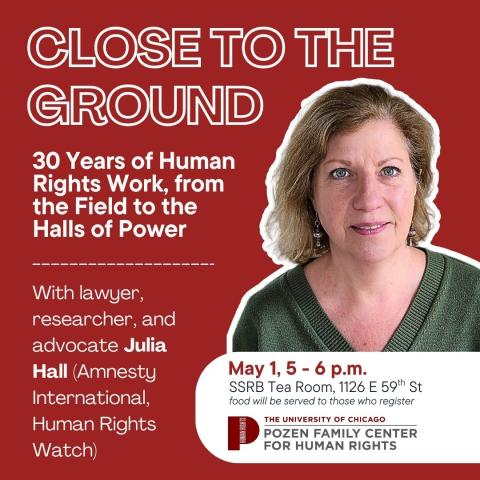What does it feel like to fight for human rights? Can the human rights project still work? How can fieldwork lead to real success in promoting accountability and remedies for survivors of human rights violations?
Pozen Visiting Professor Julia Hall will reflect on her career at Amnesty International and Human Rights Watch, providing a tour of some of the key human rights issues of our time through the lens of individual experience. Looking back at pivotal cases where fieldwork and advocacy were successful, despite the odds, she will consider the personal perspectives of people whose rights were being violated––alongside her own as a lawyer, researcher, and advocate. Topics covered will include Guantánamo Bay, Hungary's rightward turn, support for civil society in Türkiye, the Russia/Ukraine War, and strategic litigation on the rights of refugees and migrants. At a time when the "human rights project" is under tremendous stress, Hall's presentation will be a reminder of the promise that it can hold. Food will be served to those who register.
After her talk, Hall will be in conversation with Tom Ginsburg, Leo Spitz Distinguished Service Professor of International Law in the Law School and co-chair of the Pozen Faculty Board.
Julia Hall is a US-trained lawyer who served as co-director of research in Amnesty International’s Europe Regional Office in the organization's International Secretariat from 2021-2023. Hall was Amnesty's expert on counter-terrorism and human rights in Europe from 2009-2024 and was senior legal counsel in the Terrorism and Counter-Terrorism Program at Human Rights Watch from 1996-2009.
She has conducted research, advocacy, and strategic litigation in over 25 countries and in a range of areas, including: freedom of expression in Europe; racial and gender discrimination; the prohibition against torture; refugee/migrants' rights; administrative and preventive detention; and oversight of intelligence agencies. She has also served as a trial monitor, including as a legal observer at military commissions' proceedings at Guantánamo Bay.
She has authored numerous reports, articles, op-eds and amicus briefs; conducted advocacy at the United Nations, Council of Europe, European Union, OSCE, and at national levels; and served as an expert in individual cases before the European Court of Human Rights, and in UK, Canadian and US federal courts.
Hall was an adjunct professor at the State University of New York at Buffalo between 1996 and 2003. She is a Fulbright Fellow (American University in Cairo, Egypt) and a Rotary International Fellow (Australian National University). She is a graduate of Fordham University and the SUNY Buffalo School of Law, and was a Ford Fellow at The Hague Academy of International Law and a fellow of the Salzburg Seminar. She is a former member of the International Bar Association's Task Force on Terrorism/Counter-Terrorism. Her current research focuses on freedom of speech and other expression in the context of protest movements.
Tom Ginsburg is the Leo Spitz Distinguished Service Professor of International Law in the Law School, Ludwig and Hilde Wolf Research Scholar, Professor in the Department of Political Science, and serves as co-chair of the Pozen Center Faculty Board.
Professor Ginsburg is the author of Democracies and International Law, winner of two best book prizes, and How to Save a Constitutional Democracy, written with Aziz Z. Huq, which won the best book award from the International Society of Constitutional Law. He is the co-editor of Buddhism and Comparative Constitutional Law and co-host, with Professor Claudia Flores, of the Entitled podcast on human rights.
Before entering law teaching, he served as a legal adviser at the Iran-U.S. Claims Tribunal, The Hague, Netherlands, and he continues to work with numerous international development agencies and foreign governments on legal and constitutional reform.

